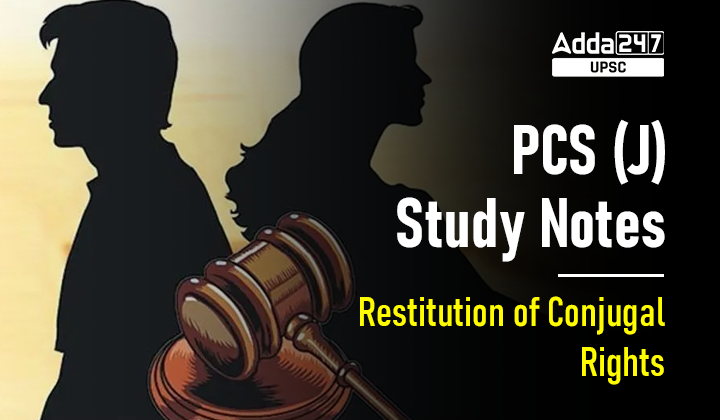Table of Contents
Meaning of restitution of conjugal rights
A conjugal right is the legal right to continue living together after marriage. The right of a husband and wife to freely have sexual relations with one another. There is a perception that this entitles one to marriage benefits. Husbands and wives are prohibited from unjustifiably excluding each other from their respective social circles, as stated in Section 9 of the Hindu Marriage Act of 1955. When a couple’s marital rights have been violated, the offended party can file petition in the court for a restoration of the rights.
Section 9 of the Hindu Marriage Act of 1955 defines social isolation as one spouse isolating themselves from the other without good reason. To have their marriage rights reinstated after being wronged, victims can submit a petition with the district court. In cases where the court finds no reasonable defence and the petition’s claims to be true, it may order the restitution of conjugal rights.
Reason for giving relief
For the sake of maintaining the legitimacy and sanctity of marriage, the law provides a legislative remedy for reclaiming the companionship of a deserting spouse.
When & Where is the the Petition filed?
When a spouse is unjustly deprived from the other’s presence, any spouse may seek relief from the district court. Under Section 19 of the Hindu Marriage Act, the Principal Judge of the Family Court will be consulted for Restitution of Conjugal Rights. It is required by the Hindu Marriage Act of 1955 that any petition for dissolution of marriage be filed in the Family Court of the original civil jurisdiction of the place where:
“a) the marriage was solemnised;
- b) the respondent resides;
- c) the parties to the marriage last lived together; and
- d) if the wife is the petitioner, the place where she has been residing on the date of filing the petition.”
Procedure And Steps For Restitution Of Conjugal Rights:
Step 1: File the Petition;
Step 2: File the Reply;
Step 3: Present the Petitioner’s Evidence;
Step 4: Present the Respondent’s Evidence;
Step 5: Present the Arguments;
Step 6: Present the Judgment & Decree.
Conclusion
It’s not easy to bring two people back together once they’ve grown emotionally distant from one another. A restitution of conjugal rights is an example of a matrimonial remedy that can put pressure on the offending party to work toward marital reconciliation, but it is not a panacea. There are also those who argue that it is counter to natural law philosophy.
दाम्पत्य अधिकारों की बहाली का अर्थ
दाम्पत्य अधिकार विवाह के बाद भी साथ रहने का कानूनी अधिकार है। पति-पत्नी का एक-दूसरे के साथ स्वतंत्र रूप से यौन संबंध रखने का अधिकार। ऐसी धारणा है कि इससे व्यक्ति को विवाह में लाभ मिलता है। हिंदू विवाह अधिनियम 1955 की धारा 9 में बताए गए अनुसार पति और पत्नियों को अपने-अपने सामाजिक दायरे से अनुचित रूप से एक-दूसरे को बाहर करने से प्रतिबंधित किया गया है। जब एक जोड़े के वैवाहिक अधिकारों का उल्लंघन किया गया है, तो नाराज पक्ष बहाली के लिए अदालत में याचिका दायर कर सकता है। अधिकारों की।
1955 के हिंदू विवाह अधिनियम की धारा 9 सामाजिक अलगाव को परिभाषित करती है क्योंकि एक पति या पत्नी बिना किसी अच्छे कारण के खुद को दूसरे से अलग कर लेते हैं। गलत होने के बाद अपने विवाह अधिकार को बहाल करने के लिए पीड़ित जिला अदालत में याचिका दायर कर सकते हैं। ऐसे मामलों में जहां अदालत को कोई उचित बचाव नहीं मिलता है और याचिका के दावे सही हैं, वह वैवाहिक अधिकारों की बहाली का आदेश दे सकता है।
राहत देने की वजह
विवाह की वैधता और पवित्रता को बनाए रखने के लिए, कानून एक परित्यक्त पति या पत्नी के साहचर्य को पुनः प्राप्त करने के लिए एक विधायी उपाय प्रदान करता है।
याचिका कब और कहाँ दायर की जाती है?
जब एक पति या पत्नी को दूसरे की उपस्थिति से अन्यायपूर्ण तरीके से वंचित किया जाता है, तो कोई भी पति या पत्नी जिला अदालत से राहत की मांग कर सकता है। हिंदू विवाह अधिनियम की धारा 19 के तहत वैवाहिक अधिकारों की बहाली के लिए परिवार न्यायालय के प्रधान न्यायाधीश से परामर्श किया जाएगा। 1955 के हिंदू विवाह अधिनियम द्वारा यह आवश्यक है कि विवाह के विघटन के लिए कोई भी याचिका उस स्थान के मूल नागरिक अधिकार क्षेत्र के पारिवारिक न्यायालय में दायर की जाए जहां:
“ए) विवाह को अनुष्ठापित किया गया था;
बी) प्रतिवादी निवास करता है;
ग) विवाह के पक्षकार पिछली बार एक साथ रहते थे; तथा
घ) यदि पत्नी याचिकाकर्ता है, तो याचिका दायर करने की तिथि को वह स्थान जहां वह रह रही है।”
वैवाहिक अधिकारों की बहाली के लिए प्रक्रिया और कदम:
चरण 1: याचिका दायर करें;
चरण 2: उत्तर दर्ज करें;
चरण 3: याचिकाकर्ता के साक्ष्य प्रस्तुत करें;
चरण 4: प्रतिवादी का साक्ष्य प्रस्तुत करें;
चरण 5: तर्क प्रस्तुत करें;
चरण 6: निर्णय और डिक्री प्रस्तुत करें।
निष्कर्ष
एक बार भावनात्मक रूप से दूर हो जाने के बाद दो लोगों को एक साथ वापस लाना आसान नहीं है। वैवाहिक अधिकारों की बहाली एक वैवाहिक उपाय का एक उदाहरण है जो आपत्तिजनक पक्ष पर वैवाहिक सुलह की दिशा में काम करने के लिए दबाव डाल सकता है, लेकिन यह रामबाण नहीं है। ऐसे लोग भी हैं जो तर्क देते हैं कि यह प्राकृतिक कानून दर्शन के विरुद्ध है।



 TSPSC Group 1 Question Paper 2024, Downl...
TSPSC Group 1 Question Paper 2024, Downl...
 TSPSC Group 1 Answer key 2024 Out, Downl...
TSPSC Group 1 Answer key 2024 Out, Downl...
 UPSC Prelims 2024 Question Paper, Downlo...
UPSC Prelims 2024 Question Paper, Downlo...






